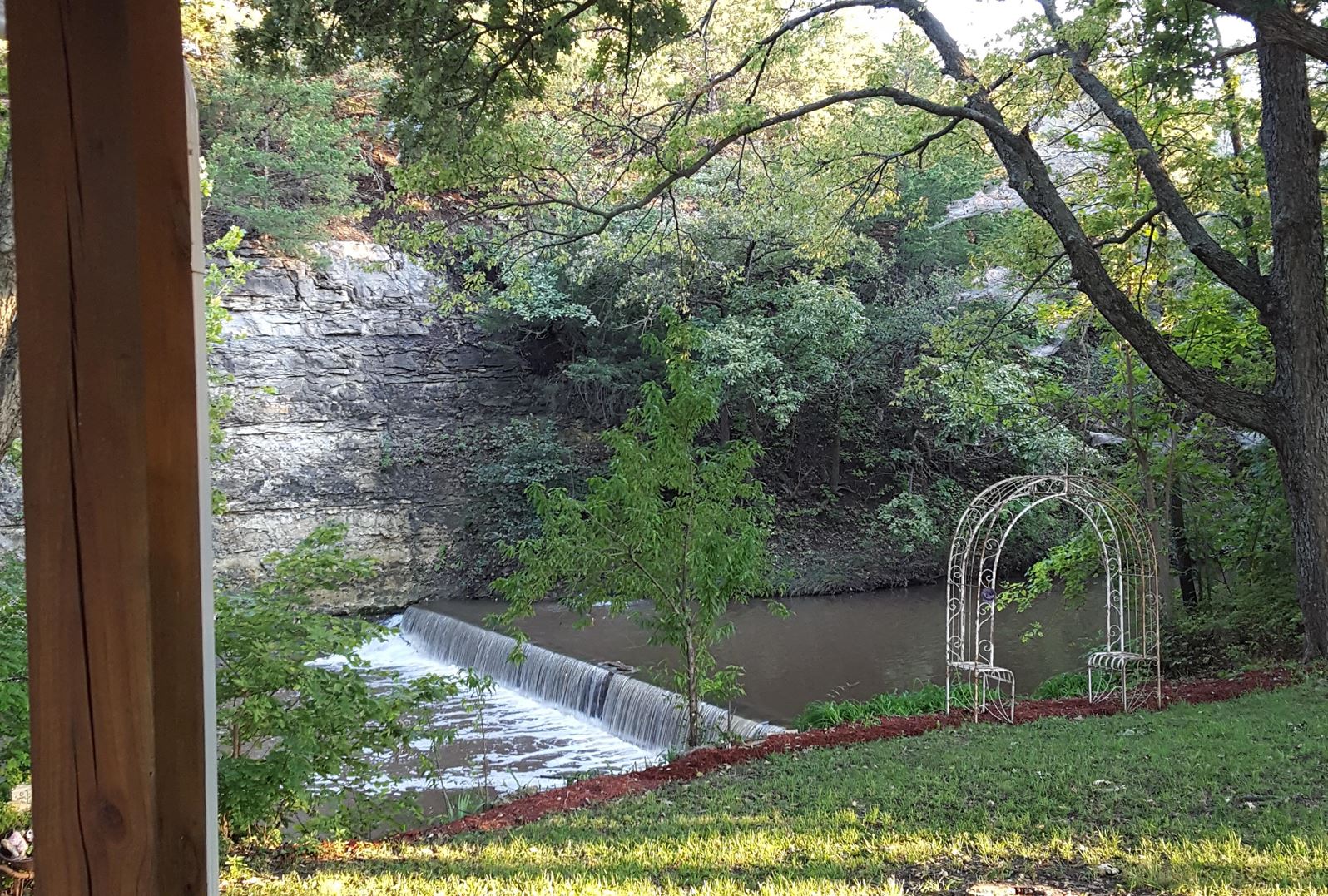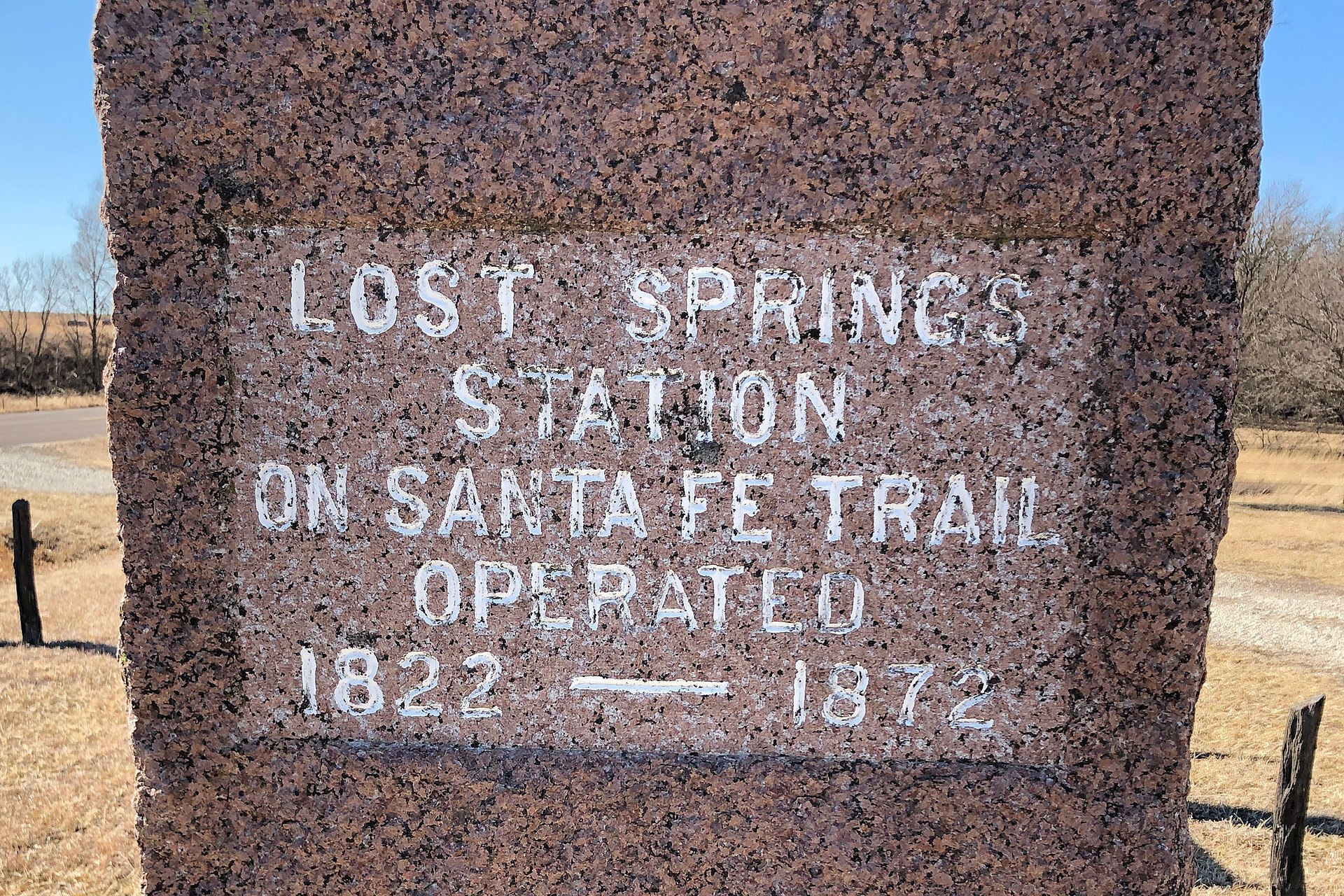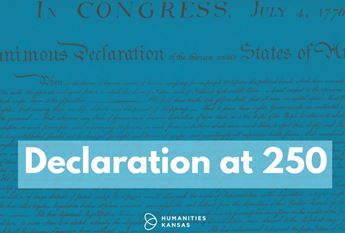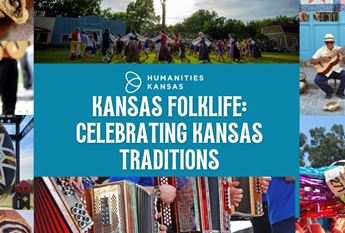

Water, Water Everywhere
April 21, 2022

Lost Springs Station marker on the Santa Fe Trail. Courtesy of Wikimedia. Public domain image accessed March 29, 2022.
Water is a powerful force. It carved the rolling hills and limestone ledges of the Flint Hills. It feeds the natural springs that have quenched the thirst of early Indigenous populations, travelers, settlers, wildlife, and livestock for generations. But what happens if the water runs out? Water, Water Everywhere, an upcoming community conversation on Saturday, May 14th supported by an HK Action Grant, seeks to engage Kansans in finding the answer to this question: What can we do now to have “water wealth” for future generations?
The Flint Hills community of Marion is surrounded by two lakes and fed by natural springs. The mineral springs have long attracted travelers, wellness seekers, and entrepreneurs to Marion. Lost Springs was known to disappear for days or weeks at a time, but it was an important water source for Indigenous tribes, Spanish explorers, and Santa Fe Trail travelers despite its fickle nature. In the 1880s, Marion County's springs were touted for their medicinal values and entrepreneur Dr. George L. Piper established a sanitorium-style resort at “Chingawassa Springs.” Dr. Piper claimed the mineral waters at his resort cured “Rheumatism…paralysis, skin and blood diseases, kidney and liver complaints, chronic constipation, hemorrhoids, catarah [sic], nervous and general debility and female weakness.” It was a bold claim and while the resort closed after a few years, the springs remained.
Today, visitors can visit natural springs at the Brooker Central Park in Marion. It’s there on May 14th that Water, Water Everywhere will take place. The panel discussion brings together geologist Rex Buchanan, rancher Jim Hoy, and water conservationist Heidi Mehl. The free event occurs after a ticketed natural springs tour and is presented by the Prairie Muses.
The trio of experts will explore the history of natural springs in Marion and the future of water in Kansas and around the world. Buchanan, the former director of the Kansas Geological Survey and the author of books about Kansas geology and water, explains how the waters found in Kansas were formed and how time and use have altered water systems. Hoy, a 5th-generation Kansas rancher, folklorist, and retired professor at Emporia State University, shares cultural and historical uses of natural springs and water resources by settlers, ranchers, and farmers. Mehl, Director of Kansas Water and Agriculture programs for the Nature Conservancy, focuses on water issues across the state and how new approaches to water use efficiency can benefit all communities and wildlife.
While water may be plentiful in Marion today, the water future for Marion and the rest of the state remains uncertain. Water, Water Everywhere provides an opportunity for participants to learn about the past and reflect upon the future of water in Kansas. According to Buchanan, this is a discussion that cannot wait. “The projection for western Kansas is not good and the future is here,” warns Buchanan. “Economy, resources, and culture all play a part."
Learn more about the free Water, Water Everywhere event on May 14th at 4:00pm in Marion at flinthillscounterpoint.org.
JOIN THE MOVEMENT OF IDEAS
- READ "(Mineral) Spring Fever Hits Kansas" about the Chingawassa Springs report and other stories of water in Kansas on the Kansas Stories Blog.
- APPLY for an HK Action Grant for a community project that draws on history, literature, and culture to engage the public with stories that spark conversations. These grants have no deadline. Contact Leslie VonHolten, Director of Grants and Outreach, for more information.
- LISTEN to the new episode of the Kansas 1972 podcast. Coming soon: “Only You: Smokey Bear and the Roots of Environmentalism.” Just in time for Earth Day, this episode revisits a proposed nuclear waste site, the introduction of new agricultural practices, efforts to preserve the tallgrass prairie, and Smokey Bear’s surprising Kansas connection. Listen where you find podcasts or at humanitieskansas.org.
- BRING Rex Buchanan and Jim Hoy to your community with HK Speaker’s Bureau. Buchanan’s “Petroglyphs of the Kansas Smoky Hills” and Hoy’s “Kansas Legends and Folktales” are available along with 60 other topics about Kansas history and culture.
- EXPLORE Kansas’s water history through firsthand accounts in “Shared Stories of the Kansas Land.” These reader’s theater scripts offer insights into water rights, droughts, and flood control efforts of the 19th and 20th centuries.



